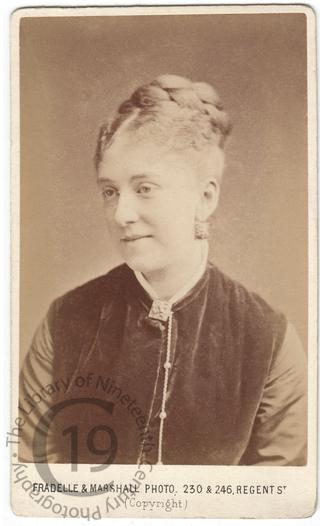
Amy Roselle
A carte-de-visite portrait of the English actress Amy Roselle (1854-1895), who died in Sydney in 1895 in a suicide pact with her husband.
Born Amy Louise Hawkins in Lambeth in 1852, she was the eleventh of the thirteen children of William Hawkins and his wife Sarah (née Rowsell). Although she later claimed that her father was the headmaster of Glastonbury Grammar School, the census returns tell a different story. In 1851 her father was an insurance agent living in Lambeth and in 1861 he was a ‘Commercial Traveller, out of employment’ living in Bethnal Green.
Amy began her career playing juvenile roles opposite her older brother Percy but soon graduated to Shakespeare. By the age of 16 she was playing Lady Teazle at the Haymarket. Numerous other engagements followed and she also toured with Sothern. One of her greatest successes was as Lady Macbeth with Henry Irving at the Lyceum, taking over when Ellen Terry fell ill. For the same reason, she also played Queen Katherine to Irving’s Henry VIII for thirty-five performances.
While she was playing leading lady to Wilson Barrett during a long engagement at the Royal Court, she met and fell in love with another member of the cast, doctor-turned-actor Arthur Dacre [real name: Arthur Culver James]; the two were married in London in 1884, once Dacre had obtained a divorce from his first wife. Professionally, Amy was in more demand than her husband, but the two insisted on being engaged jointly. For some years they toured the provinces together, but when work dried up debts soon accumulated. Eventually they decided to try their luck in Australia, where they appeared in Melbourne, Adelaide and Sydney, but following a disagreement with theatre management, the couple grew despondent and died together in an apparent suicide pact in their Sydney lodging house. Dacre shot his wife twice in the chest and then slit his own throat with a razor.
Although some newspapers reported their end as a murder-suicide (Dacre had supposedly murdered his wife and then committed suicide), according to a report in the Dundee Advertiser (18 November 1895): ‘The tragedy was mutually decided upon, owing to the lack of success of their Australian tour. They have left most pathetic letters – one to Mr Clement Scott [English theatre critic and playwright]. Similarly, the St James Gazette (19 November 1895) reported that: ‘All the particulars of the Dacre-Roselle tragedy tend to show premeditation, and the existence of a complete understanding between husband and wife. Both in fact had spoken to their friends from time to time contemplating suicide.’
Photographed by Fradelle and Marshall of London.
Code: 126630




